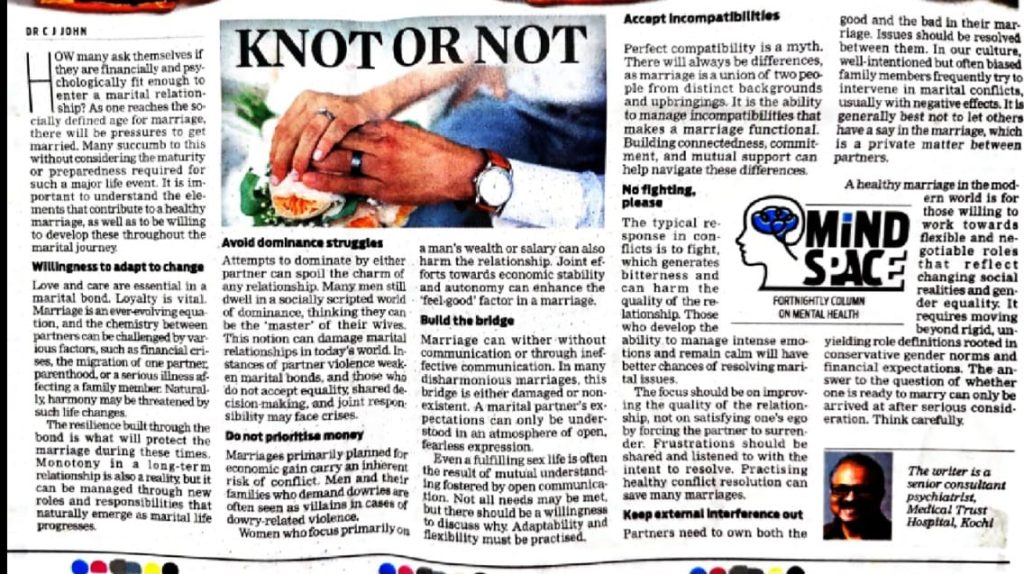The resilience built through the bond is what will protect the marriage during these times.
KOCHI: How many ask themselves if they are financially and psychologically fit enough to enter a marital relationship? As one reaches the socially defined age for marriage, there will be pressures to get married. Many succumb to this without considering the maturity or preparedness required for such a major life event. It is important to understand the elements that contribute to a healthy marriage, as well as to be willing to develop these throughout the marital journey.

Willingness to adapt to change
Love and care are essential in a marital bond. Loyalty is vital. Marriage is an ever-evolving equation, and the chemistry between partners can be challenged by various factors, such as financial crises, the migration of one partner, parenthood, or a serious illness affecting a family member. Naturally, harmony may be threatened by such life changes.
The resilience built through the bond is what will protect the marriage during these times. Monotony in a long-term relationship is also a reality, but it can be managed through new roles and responsibilities that naturally emerge as marital life progresses.
Avoid dominance struggles
Attempts to dominate by either partner can spoil the charm of any relationship. Many men still dwell in a socially scripted world of dominance, thinking they can be the ‘master’ of their wives. This notion can damage marital relationships in today’s world. Instances of partner violence weaken marital bonds, and those who do not accept equality, shared decision-making, and joint responsibility may face crises.
Do not prioritise money
Marriages primarily planned for economic gain carry an inherent risk of conflict. Men and their families who demand dowries are often seen as villains in cases of dowry-related violence.
Women who focus primarily on a man’s wealth or salary can also harm the relationship. Joint efforts towards economic stability and autonomy can enhance the ‘feel-good’ factor in a marriage.
Build the bridge
Marriage can wither without communication or through ineffective communication. In many disharmonious marriages, this bridge is either damaged or nonexistent. A marital partner’s expectations can only be understood in an atmosphere of open, fearless expression.
Even a fulfilling sex life is often the result of mutual understanding fostered by open communication. Not all needs may be met, but there should be a willingness to discuss why. Adaptability and flexibility must be practised.
Accept incompatibilities
Perfect compatibility is a myth. There will always be differences, as marriage is a union of two people from distinct backgrounds and upbringings. It is the ability to manage incompatibilities that makes a marriage functional. Building connectedness, commitment, and mutual support can help navigate these differences.
No fighting, please
The typical response in conflicts is to fight, which generates bitterness and can harm the quality of the relationship. Those who develop the ability to manage intense emotions and remain calm will have better chances of resolving marital issues.
The focus should be on improving the quality of the relationship, not on satisfying one’s ego by forcing the partner to surrender. Frustrations should be shared and listened to with the intent to resolve. Practising healthy conflict resolution can save many marriages.
Keep external interference out
Partners need to own both the good and the bad in their marriage. Issues should be resolved between them. In our culture, well-intentioned but often biased family members frequently try to intervene in marital conflicts, usually with negative effects. It is generally best not to let others have a say in the marriage, which is a private matter between partners.
A healthy marriage in the modern world is for those willing to work towards flexible and negotiable roles that reflect changing social realities and gender equality. It requires moving beyond rigid, unyielding role definitions rooted in conservative gender norms and financial expectations. The answer to the question of whether one is ready to marry can only be arrived at after serious consideration. Think carefully.
Dr C J John
The writer is a senior consultant psychiatrist, Medical Trust Hospital, Kochi


